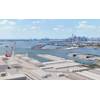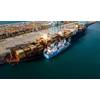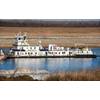
Shipyard Closes, Leaves “Ghost Fleet” Ships in Limbo
November 9, 2007
The fates of six ships from the James River Reserve Fleet are in limbo after a Maryland salvage yard that was supposed to scrap the vessels abruptly closed and its owners disappeared.
North American Ship Recycling Inc., near Baltimore, won federal contracts in August worth $2.1m to dispose of the government-owned dinosaurs.
But the yard, which opened in 2004 amid much fanfare, including a celebratory speech from then-U.S. Transportation Secretary Norman Y. Mineta, shut down without notice sometime last month, leaving behind two of the Virginia "ghost fleet" ships and plenty of questions.
To protect against a fuel spill, government-hired crews have since installed rubber booms around the two abandoned ships, the Sphinx and the Hoist, and will monitor them daily until the matter is resolved, officials said.
Both ships were built during World War II. The Sphinx is classified as a high environmental risk, loaded with waste oil, lead paint and toxic PCBs.
The U.S. Maritime Administration, which oversees the fleet, said in a statement that it is "disappointed" by the sudden closure. The agency would not say if it paid any money to the yard owners, a consortium led by two Boston businessmen, Vincent and Timothy Barletta - only that the contracts were terminated.
The four other ships involved in the defunct deal - the Cape Charles, the Pride, the Scan and the Southern Cross - remain moored in the James River fleet, off Fort Eustis in Newport News.
The Maritime Administration said it is discussing how and where to scrap all six ships.
More than 60 unwanted James River ships have been scrapped since 2001 under various contracts with American salvage yards. An attempt to send 13 ships to England for disposal resulted in protests and controversy that continue today.
The Maritime Administration missed a September 2006 deadline set by Congress to safely get rid of all obsolete ships in reserve fleets in Virginia, Texas and California, some 150 vessels.
Congress worried that the aging vessels posed undue environmental risks to host waterways because of thinning hulls and tons of waste oil and other toxics still on board.
One beneficiary in the Baltimore flap may be Bay Bridge Enterprises, a salvage yard in Chesapeake with experience in recycling ghost ships.
Bay Bridge is the closest facility to Baltimore, and company officials have been meeting with Maritime Administration staff, industry analysts said.
[Source: http://content.hamptonroads.com]
Related News
 US Halts Empire Wind Project
US Halts Empire Wind Project
 AD Ports Group: First Ship-to-Ship LNG Bunkering at Khalifa Port
AD Ports Group: First Ship-to-Ship LNG Bunkering at Khalifa Port
 Outcomes of the Marine Environment Protection Committee (MEPC 83)
Outcomes of the Marine Environment Protection Committee (MEPC 83)
 Modernizing Mariner Credentialing: A Maritime Workforce Imperative
Modernizing Mariner Credentialing: A Maritime Workforce Imperative
 Saltchuk Chairman Tabbutt Prioritizes Workforce Development
Saltchuk Chairman Tabbutt Prioritizes Workforce Development





